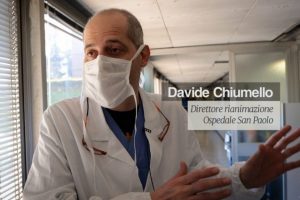 Interview with Professor Davide Chiumello, surgeon, Director of the Anesthesia and Resuscitation complex structure of the San Paolo Hospital in Milan.
Interview with Professor Davide Chiumello, surgeon, Director of the Anesthesia and Resuscitation complex structure of the San Paolo Hospital in Milan.
MGM. Professor Chiumello, is it a paradox to talk about the humanisation of care at the time of COVID-19?
DC. No, we treat patients precisely as we cared for them before the pandemic. Yet, numbers make the difference: we are facing a rising tide. The numbers have increased in the last three weeks, and while last week we had older patients over the age of 70, we are now taking care of a growing number of patients between the ages of 55 and 60. Older people have realized that they have to stay at home, but adults, not enough yet. Stay at home: this is my call, because this disease, for which there is no effective medicine today, affects people of all ages.
MGM. The mortality rate you report on patients in resuscitation is around 20-30%. Once, in intensive and palliative care patient management protocols, before the COVID-19 epidemic, there was much room for contact, greeting with loved ones. Now some doctors say that “these patients die alone”, and this is reasonably true: can anything be done?
DC. We immediately sedate patients before they are intubated and resuscitated. Right away. Anaesthesia is the highest form of humanisation we can apply right now. Their loved ones can see them through the protection glass. We don’t have enough masks and protective medical devices to give to relatives. We have a few of them ourselves, and the priority now is the safety of the operators. But patients are not aware of anything and feel no pain. That is what we can do for them, as well as treating them to the best of our ability. But I repeat, there are no drugs in the here and now, so we can only “buy time”, hoping for improvements or new discoveries.
MGM. Let’s talk about how you communicate grief.
DC. It depends on the situation the family member is in, whether he/she is in quarantine or not. First, we warn of the aggravation or by phone or in attendance. If the patient deceases, we notify it over the phone to family members who are in isolation and unfortunately have not been able to see their loved one. If possible, we inform them in attendance. However, we have psychological support groups at the moment, both for family members and for us, professionals.
MGM. Some people propose to use tablets to communicate, virtually crossing the glass, precisely to avoid the risk of infection, with their loved ones. Is it feasible?
DC. Yes, it is a practice to pursue. There are more and more tablets coming from private donations; we hope to have more and more. As soon as the patient wakes up, he/she needs to regain contact with his/her affections, and the tablet also becomes therapeutic. It’s a beautiful thing.
MGM. Professor Chiumello, our Journal is read all over the world: do you have anything else to add?
DC. Stay at home; this “thing” doesn’t make discrimination among the age of anyone… Protect yourselves and your loved ones. We must gain time to win this battle.
